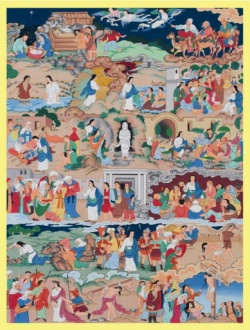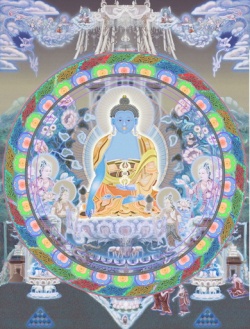Difference between revisions of "Lohicco Sutta"
m (Text replace - "Category:Samyutta Nikaya" to "{{R}} [http://www.dhammawiki.com/index.php?title=Category:Samyutta_Nikaya dhammawiki.com] Category:Samyutta Nikaya") |
m (Text replacement - "[[[" to "([[") |
||
| (5 intermediate revisions by 2 users not shown) | |||
| Line 1: | Line 1: | ||
| − | Lohicco Sutta: Lohicca | + | {{DisplayImages|3377|70}} |
| + | {{Centre|{{Big2x|Lohicco Sutta: Lohicca }}<br/> | ||
| + | translated from the [[Pali]] by <br/> | ||
| + | Maurice O'Connell Walshe}}<br/><br/> | ||
| − | + | [The Pupils of the [[Brahman]] [[Lohicca]] abused the Ven. Kaccaana the Great (Mahaa-Kaccaana.) He addressed them in these verses:] | |
| − | + | <poem> | |
| − | + | First in [[virtue]] were the men of old, | |
| − | + | [[Brahmans]] who preserved the {{Wiki|ancient}} ways, | |
| − | [The Pupils of the Brahman Lohicca abused the Ven. Kaccaana the Great (Mahaa-Kaccaana.) He addressed them in these verses:] | + | In whom well guarded were the doors of the [[sense]]. |
| − | + | They were never overcome by [[wrath]]. | |
| − | First in virtue were the men of old, | + | [[Meditating]] on the Law[1] their [[joy]], |
| − | Brahmans who preserved the ancient ways, | + | [[Brahmans]] who preserved the {{Wiki|ancient}} ways. |
| − | In whom well guarded were the doors of the sense. | + | These backsliders who but [[chant]] by rote, |
| − | They were never overcome by wrath. | + | Drunk with [[pride]] of [[birth]] they stagger on. |
| − | Meditating on the Law[1] their joy, | + | Full of [[violent]] [[rage]], [[aggression]] prone, |
| − | Brahmans who preserved the ancient ways. | + | They lose [[respect]] from weak and strong alike: |
| − | These backsliders who but chant by rote, | + | Their unguarded [[senses]] bring them loss, |
| − | Drunk with pride of birth they stagger on. | + | Like a [[treasure]] hoard found in a [[dream]]. |
| − | Full of violent rage, aggression prone, | + | [[Fasting]], [[sleeping]] on the ground, and such, |
| − | They lose respect from weak and strong alike: | + | Dawn ablutions, [[chanting]] {{Wiki|Vedic}} texts, |
| − | Their unguarded senses bring them loss, | + | Garb of skins, matted [[hair]] and filth, |
| − | Like a treasure hoard found in a dream. | + | [[Magic]] {{Wiki|spells}} and [[rites]] and penances, |
| − | Fasting, sleeping on the ground, and such, | + | Trickery, [[deception]], blows as well, |
| − | Dawn ablutions, chanting Vedic texts, | + | [[Ritual]] washing, rinsing of the {{Wiki|mouth}}, |
| − | Garb of skins, matted hair and filth, | ||
| − | Magic spells and rites and penances, | ||
| − | Trickery, deception, blows as well, | ||
| − | Ritual washing, rinsing of the mouth, | ||
These are caste-marks[2] of the Brahman-folk, | These are caste-marks[2] of the Brahman-folk, | ||
Done and practiced for some trifling gain. | Done and practiced for some trifling gain. | ||
| − | But a heart that's firm and concentrated, | + | But a [[heart]] that's firm and [[concentrated]], |
| − | Purified, of all defilements freed, | + | [[Purified]], of all [[defilements]] freed, |
Kind and gentle to all living things | Kind and gentle to all living things | ||
| − | That's the path that gains the highest goal. | + | That's the [[path]] that gains the [[highest]] goal. |
| − | [Lohicca goes angrily to see the Ven. Kaccaana, who confirms what he has said. Then Lohicca asks:] "You said 'with sense-doors unguarded,' Venerable Kaccaana. In what way is one 'with sense-doors unguarded'?" | + | ([[Lohicca]] goes angrily to see the Ven. Kaccaana, who confirms what he has said. Then [[Lohicca]] asks:] "You said 'with [[sense-doors]] unguarded,' [[Venerable]] Kaccaana. In what way is one 'with [[sense-doors]] unguarded'?" |
| − | + | </poem> | |
| − | "In this case, Brahman, someone, seeing objects with the eye, is attracted to things that are pleasing, and repelled by things that are unpleasing. He dwells without mindfulness and his mind is restricted. He does not experience the emancipation of the heart through wisdom. And so those evil and unwholesome states do not cease without remainder. Hearing a sound..., smelling a scent..., tasting a flavor..., touching an object..., cognizing a mind-object..., he is attracted by things that are pleasing, and repelled by things that are unpleasing... And so those evil and unwholesome states do not cease without remainder. That is how one is 'with sense-doors unguarded.' Now in what way is one 'with sense-doors guarded?' | + | "In this case, [[Brahman]], someone, [[seeing]] [[objects]] with the [[eye]], is attracted to things that are [[pleasing]], and repelled by things that are unpleasing. He dwells without [[mindfulness]] and his [[mind]] is restricted. He does not [[experience]] the {{Wiki|emancipation}} of the [[heart]] through [[wisdom]]. And so those [[evil]] and [[unwholesome]] states do not cease without remainder. Hearing a [[sound]]..., [[smelling]] a {{Wiki|scent}}..., [[tasting]] a {{Wiki|flavor}}..., [[touching]] an [[object]]..., [[Wikipedia:Cognition|cognizing]] a [[mind-object]]..., he is attracted by things that are [[pleasing]], and repelled by things that are unpleasing... And so those [[evil]] and [[unwholesome]] states do not cease without remainder. That is how one is 'with [[sense-doors]] unguarded.' Now in what way is one 'with [[sense-doors]] guarded?' |
| − | "In this case, Brahman, a monk, seeing objects with the eye, is not attracted to things that are pleasing and not repelled by things that are unpleasing. He dwells with mindfulness present, and his mind is unbounded. Thus he experiences the emancipation of the heart through wisdom and so those evil and unwholesome states that arise cease without remainder. | + | "In this case, [[Brahman]], a [[monk]], [[seeing]] [[objects]] with the [[eye]], is not attracted to things that are [[pleasing]] and not repelled by things that are unpleasing. He dwells with [[mindfulness]] {{Wiki|present}}, and his [[mind]] is unbounded. Thus he [[experiences]] the {{Wiki|emancipation}} of the [[heart]] through [[wisdom]] and so those [[evil]] and [[unwholesome]] states that arise cease without remainder. |
| − | [Likewise for sounds, smells, flavors, tangibles and mind-objects.] "In this way one is 'with sense-doors guarded.'" | + | [Likewise for {{Wiki|sounds}}, {{Wiki|smells}}, {{Wiki|flavors}}, tangibles and [[mind-objects]].] "In this way one is 'with [[sense-doors]] guarded.'" |
| − | [Lohicca becomes a lay-follower.] | + | ([[Lohicca]] becomes a lay-follower.] |
==Notes== | ==Notes== | ||
| − | 1. Not, of course, here the Buddha-Dhamma but the Vedic law. | + | 1. Not, of course, here the [[Buddha-Dhamma]] but the {{Wiki|Vedic}} law. |
| − | 2. Va.n.naa, lit. "colors." This is the word rendered "caste" in English (from Portuguese casta "breed, race"). | + | 2. Va.n.naa, lit. "colors." This is the [[word]] rendered "[[caste]]" in English (from [[Portuguese]] casta "breed, race"). |
{{R}} | {{R}} | ||
[http://www.dhammawiki.com/index.php?title=Category:Samyutta_Nikaya dhammawiki.com] | [http://www.dhammawiki.com/index.php?title=Category:Samyutta_Nikaya dhammawiki.com] | ||
| − | [[Category: | + | [[Category:Saṃyutta Nikāya]] |
Latest revision as of 07:25, 4 April 2016
Lohicco Sutta: Lohicca
translated from the Pali by
Maurice O'Connell Walshe
[The Pupils of the Brahman Lohicca abused the Ven. Kaccaana the Great (Mahaa-Kaccaana.) He addressed them in these verses:]
First in virtue were the men of old,
Brahmans who preserved the ancient ways,
In whom well guarded were the doors of the sense.
They were never overcome by wrath.
Meditating on the Law[1] their joy,
Brahmans who preserved the ancient ways.
These backsliders who but chant by rote,
Drunk with pride of birth they stagger on.
Full of violent rage, aggression prone,
They lose respect from weak and strong alike:
Their unguarded senses bring them loss,
Like a treasure hoard found in a dream.
Fasting, sleeping on the ground, and such,
Dawn ablutions, chanting Vedic texts,
Garb of skins, matted hair and filth,
Magic spells and rites and penances,
Trickery, deception, blows as well,
Ritual washing, rinsing of the mouth,
These are caste-marks[2] of the Brahman-folk,
Done and practiced for some trifling gain.
But a heart that's firm and concentrated,
Purified, of all defilements freed,
Kind and gentle to all living things
That's the path that gains the highest goal.
(Lohicca goes angrily to see the Ven. Kaccaana, who confirms what he has said. Then Lohicca asks:] "You said 'with sense-doors unguarded,' Venerable Kaccaana. In what way is one 'with sense-doors unguarded'?"
"In this case, Brahman, someone, seeing objects with the eye, is attracted to things that are pleasing, and repelled by things that are unpleasing. He dwells without mindfulness and his mind is restricted. He does not experience the emancipation of the heart through wisdom. And so those evil and unwholesome states do not cease without remainder. Hearing a sound..., smelling a scent..., tasting a flavor..., touching an object..., cognizing a mind-object..., he is attracted by things that are pleasing, and repelled by things that are unpleasing... And so those evil and unwholesome states do not cease without remainder. That is how one is 'with sense-doors unguarded.' Now in what way is one 'with sense-doors guarded?'
"In this case, Brahman, a monk, seeing objects with the eye, is not attracted to things that are pleasing and not repelled by things that are unpleasing. He dwells with mindfulness present, and his mind is unbounded. Thus he experiences the emancipation of the heart through wisdom and so those evil and unwholesome states that arise cease without remainder.
[Likewise for sounds, smells, flavors, tangibles and mind-objects.] "In this way one is 'with sense-doors guarded.'"
(Lohicca becomes a lay-follower.]
Notes
1. Not, of course, here the Buddha-Dhamma but the Vedic law.
2. Va.n.naa, lit. "colors." This is the word rendered "caste" in English (from Portuguese casta "breed, race").

